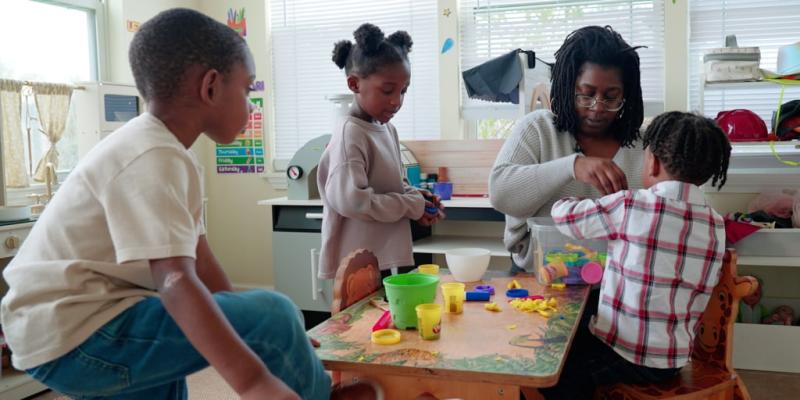Innovative program aims to increase child care options and pull women into the workforce



Across the country, high-quality, accessible and affordable early child care can be difficult to find.
A growing program in Alabama aims to ease that problem by expanding the number of at-home day care centers, in a move its creator believes will provide more care options to stressed parents and also give the workforce a boost.
"Alabama has a large workforce and a large workforce need at the same time," said Holly Glasgow, director of child development at Shelton State Community College in Tuscaloosa. "And we know that child care is one of those things that is often a barrier."
There are fewer than 50 licensed child care centers in Tuscaloosa County, and Glasgow estimates that there are about 3,000 child care spots available for the more than 12,000 kids under the age of 5.
"We realized pretty quickly that regardless of how much money they were able to raise, it would not be enough to really build enough centers across our state to be able to effectively change what we have in terms of the number of child care slots," Glasgow said.
"But what we could do instead was really focus on family child care homes. They give us the ability to kind of meet the needs of the workforce a little bit differently. They give us the opportunity to add child care in a family setting," she added.
The lack of affordable, quality child care has bedeviled parents and employers across the country for several years, even becoming a talking point in this year's presidential election. It has played a central role in discussions about the economy since the pandemic, when many child care centers closed and some parents could not return to work. According to the Census Bureau, 35% of parents with children under age 5 have no formal child care arrangements.
In the Tuscaloosa area, where major employers include manufacturing facilities that operate 24 hours a day, it can be challenging to find child care during off-hours.
"When you combine the shortage with shift-based work, one thing becomes clear: Tuscaloosa County needs more child care for its families — and part of that care at night," the program's website says.
The 3by3 program matches people who want to start at-home day cares with grants and partner organizations to help cover startup costs, one of the greatest barriers to entry for people who want to start an at-home day care.
The participants also receive about 100 hours of training, learning everything from social media marketing to the required alterations they must make to their homes.
Glasgow assists in making sure each house is up to code, visiting often and stocking each one with toys, books, carbon monoxide alarms, fire extinguishers, outlet covers and more.
Most of these homes have the capacity to care for three to six children.
The program, which launched earlier this year, has helped to set up 19 at-home day cares, each with three to six children. The operators keep all of their profits.
Among them is Lynnette Washington, a member of the inaugural 3by3 program cohort who started a home day care that her daughter can also attend.
"To be able to help kids and parents and stuff like that, because everybody got to work, and to be able to help, that's an awesome feeling," she said.
Receiving quality child care at a young age can improve numerous outcomes for children, said Steve Barnett, senior co-director of the National Institute for Early Education Research.
"We know that kids who don't get these investments can be 18 months behind when they start school. It's very difficult to ever catch up," Barnett said.
"Their language, literacy and math skills, we set the foundation for all of that. That's so important for the rest of their lives," he added. "And we know that if we do this well, kids will be more likely to go on to higher education and to be more productive and successful. And actually they'll live longer lives, healthier because of this."
Glasgow said she has big dreams for 3by3.
"I don't think Alabama is where we will stop. I do think going forward, we'll be able to provide a model for other states," she said.
"Early care and early education is pivotal," Glasgow added. "We have to make it better. And it's much easier to spend the money doing it better at the beginning than to remediate the issues at the end. By leaps and bounds."




